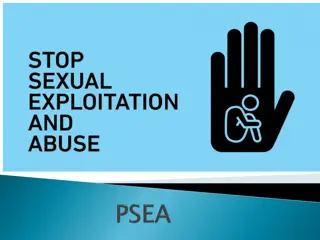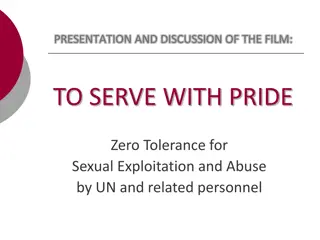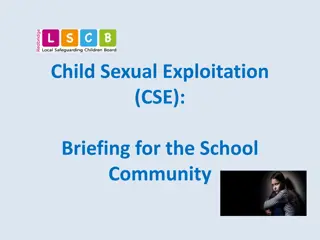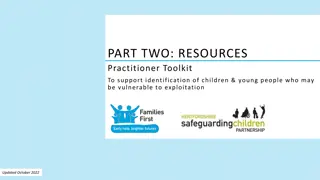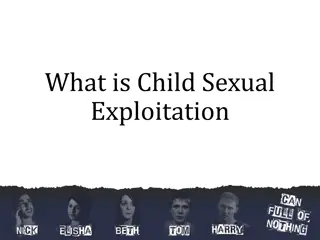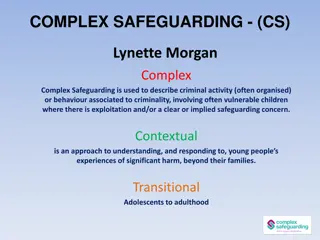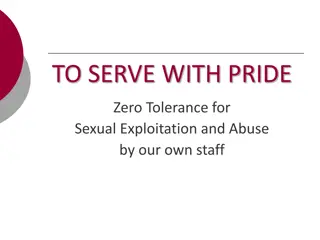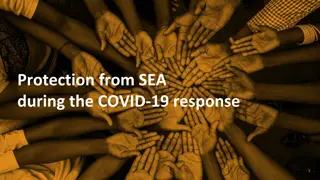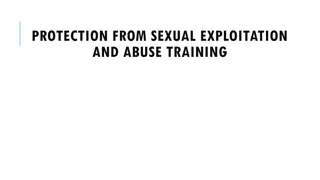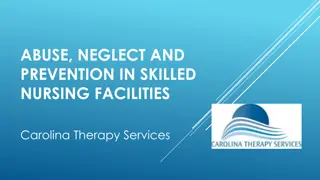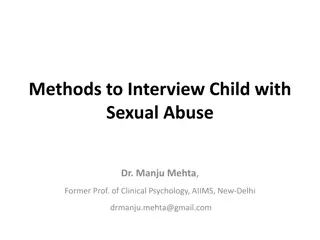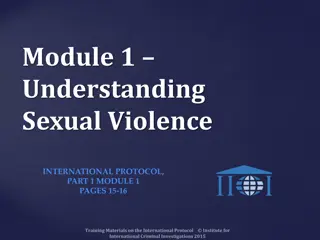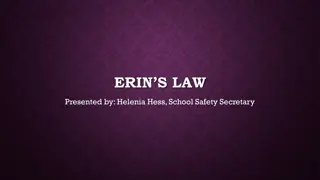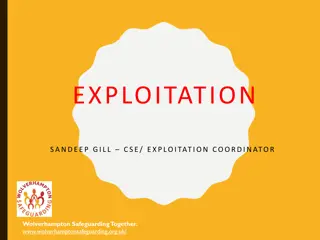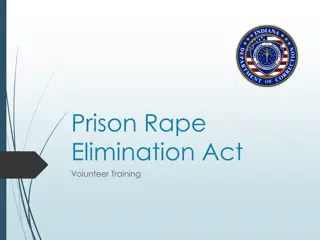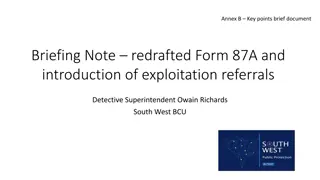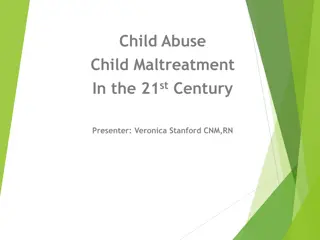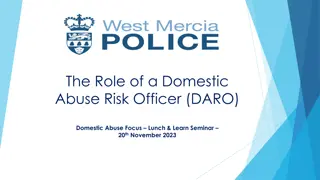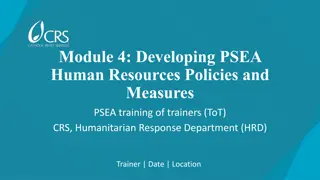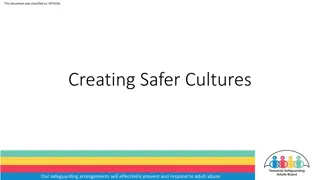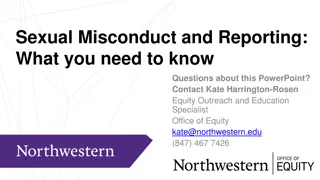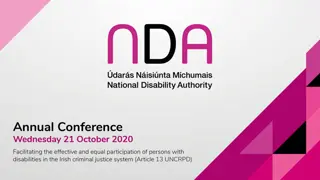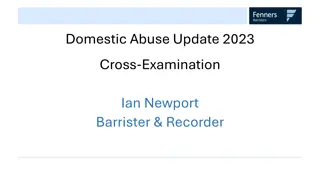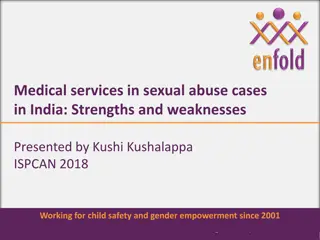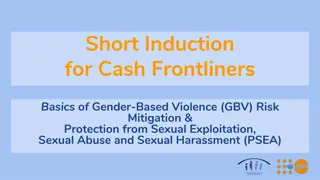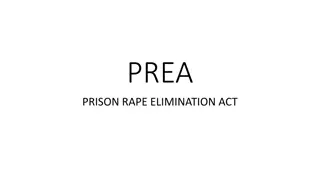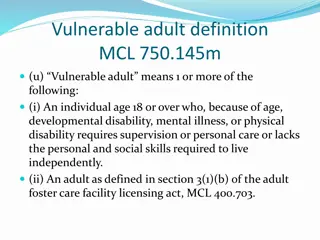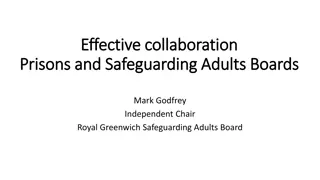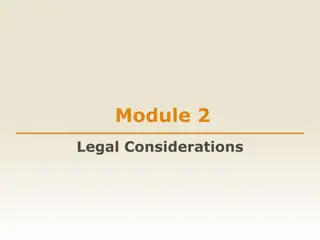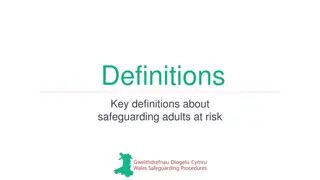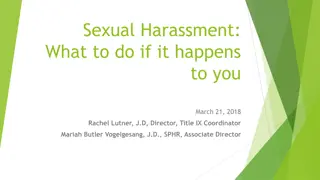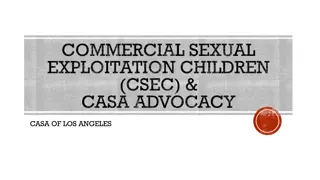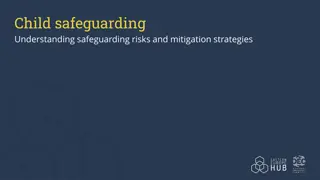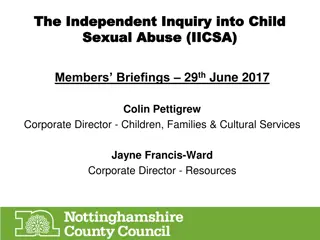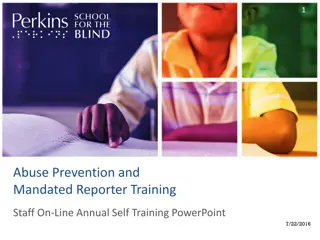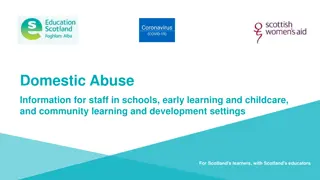Building Resilient and Responsible Communities - Safeguarding against Sexual Exploitation and Abuse
Promoting community resilience and responsibility to address sexual exploitation and abuse, the importance of reporting SEA incidents, steps to take when aware of an incident, what information to report, reporting platforms available, maintaining confidentiality, and handling SEA concerns with care to prevent and address the consequences effectively.
Download Presentation

Please find below an Image/Link to download the presentation.
The content on the website is provided AS IS for your information and personal use only. It may not be sold, licensed, or shared on other websites without obtaining consent from the author. Download presentation by click this link. If you encounter any issues during the download, it is possible that the publisher has removed the file from their server.
E N D
Presentation Transcript
BUILDING A RESILANT AND RESPONSIBLE COMMUNITY TAFARA ANESU MACHEKA
WHY IS IT IMPORTANT TO REPORT SEA? WHY IS IT IMPORTANT TO REPORT SEA? Protects the Community from Further Violation Exposes ill- treatment and mis-management of aid. Protects children and families from HIV/AIDS and Early Pregnancies
What do you Do when you Become Aware of an Incident of SEA You do not need proof before reporting but all reports must be made in good faith. Do not investigate. Always maintain strict confidentiality. Respect the dignity, wishes and rights of those affected by SEA.
What to Report??? Who committed the alleged wrongdoing? Do you know if anyone else was involved? (Provide full names, titles and organization, if possible). What has happened?(Describe in detail what you know or suspect of a SEA incident.) Who was involved? Were there any witnesses? When and where did the incident take place?Providing dates and time, if at all possible.
REPORTING PLATFORMS Established Organisational Reporting Platforms Community Structures Police 116 Freephone
CONFIDENTIELITY Confidentiality is one of the key aspects to making and receiving a complaint/report about sexual exploitation and abuse, both to protect the alleged victim and the alleged perpetrator, who also has a right to due process. Confidentiality is more easily preserved the fewer the number of people who deal with the report.
Receiving SEA Concerns in the Helpline 116 Reporting and feedback Platform May involve Childline or non Childline Staff Upholding confidentiality Application of Organisation and International standards Flag the concern with you Supervisor ASAP
CONSEQUENCES OF SEA Sexual exploitation and abuse have real and serious physical, mental, and emotional consequences which can be sometimes traumatic and long lasting. Whilst our primary concern rests with the direct victim, negative consequences of sexual exploitation and abuse can extend much further than the victim.
CONSEQUENCES ON THE VICTIM Sexually Transmitted infections Pregnancy Stigmatization Labelling Loss of self esteem Psychological Distress Weakened Family Structures
CONSEQUENCES OF ON THE COMMUNITY Breakdown of Family Structures Drain on Resources
CONSEQUENCES ON THE PERPETRATOR Loss of employment Loss of Income Prison Loss of reputation
CONSEQUENCES ON THE ORGANIZATION Loss of trust by the community Reputation Security Risks Victimization by the Community
VICTIM ASSISTANCE STRATEGY The UN adopted a victim assistance strategy on December 2007 which represents a formal commitment to assisting and supporting victims of sexual exploitation and abuse by UN staff and related personnel. The intention of the strategy is to have one victim assistance programme in each country serving all victims of UN staff and related personnel, so that care remains consistent regardless of the agency associated with the perpetrator. Services may include medical treatment, counselling, legal assistance, social support, or material care such as that which is needed for victim protection.
VICTIM ASSISTANCE STRATEGY The strategy defines three categories of victims: 1. Complainants 2. Victims 3. Children born as a result of sexual exploitation and abuse by UN Staff or related personnel
Complainants For complainants, basic assistance and support should be provided. Basic assistance is that which cannot await the substantiation of claims. For example, in many cases complainants will need to be helped to access medical treatment to meet urgent needs resulting from the sexual exploitation or abuse. This includes, where locally available, HIV/AIDS PEP kits, for example. Medical care may also be needed to address injuries sustained from the abuse suffered. In addition, complainants should be helped to access psychological counselling where needed to address, for instance, trauma suffered as a result of sexual exploitation or abuse. Complainants should be helped to find shelter, clothing or food where the sexual exploitation or sexual abuse impedes them from using their own. They should be provided with protection if their security is at risk. Complainants should also be assisted to understand how to pursue claims, both administrative and legal, against the alleged perpetrators and be referred if desired for assistance to pursue these claims
Victims Once a person s claim has been substantiated i.e. a victim s/he can receive not only the basic assistance but also additional help known as expanded assistance and support. For example, a girl was forced to drop out of school upon becoming pregnant as a result of sexual exploitation or abuse; a Victim Assistance Mechanism could assist her to access further education or a program that teaches income-generating skills so that she can support herself and her child. Victims receive expanded assistance and support which helps them to be able to move on with life after the experience.
Children born as Result of Sexual Exploitation Children born as a result of sexual exploitation and abuse should be entitled under a Victim Assistance Mechanism to receive medical, legal and psychosocial care to meet their needs directly arising from the sexual exploitation or abuse. The UN, NGOs and IGOs should also facilitate pursuit of paternity and child support claims, which might involve obtaining blood or DNA samples to share with the appropriate authorities. This should be undertaken in conjunction with the relevant national governments.



